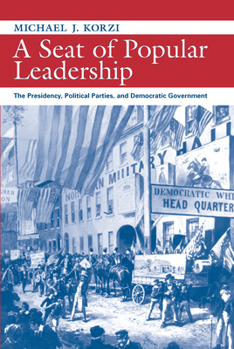A Seat of Popular Leadership: The Presidency, Political Parties, and Democratic Government
A study of the relationship between presidential leadership and public opinion, this book challenges the commonly held view that the American presidency did not become a truly "popular" institution until the early twentieth century. According to Michael J. Korzi, the democratization of the presidency can be traced back to the antebellum period, when broadly based political parties first emerged. With the development of nominating conventions, party platforms, and party patronage, presidents became bound up in a system of collective leadership anchored in the political party and beholden to a diverse and decentralized, but clearly powerful, public. Presidents were expected to act as partisans, cooperating with their fellow party members in the legislature to make good on the party's promises and to ensure victory at the polls. After the Civil War, this party-based model of presidential leadership gradually gave way to a new paradigm--the modern "rhetorical" presidency--marked by the establishment of a more direct relationship between the president and the people. The result was an institution at once more responsive to the vicissitudes of public opinion and less constrained by the obligations of partisan politics. Although he acknowledges the need for a strong executive in today's global world, Korzi sees problems in the ascendancy of this new form of presidential leadership and suggests that a partial return to the party model would be a welcome development. A modern presidency tempered and restrained by political parties, he argues, not only would restore a measure of constitutional balance but also would offer a more full-bodied relationship between president and public.
Format:Paperback
Language:English
ISBN:1558494596
ISBN13:9781558494596
Release Date:August 2004
Publisher:University of Massachusetts Press
Length:304 Pages
Weight:0.90 lbs.
Dimensions:0.7" x 5.9" x 8.9"
Customer Reviews
0 rating





